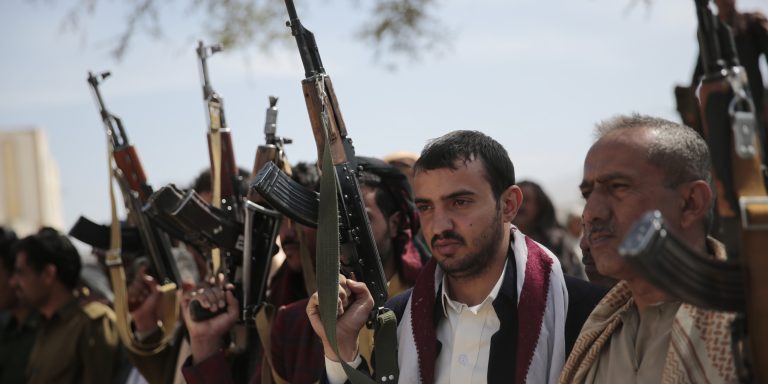INTELBRIEF
October 6, 2022
IntelBrief: Ceasefire Ends in Yemen, Lowering Hopes for a Final Settlement

Bottom Line up Front
- The ceasefire between the Iran-backed Houthi movement and the Republic of Yemen Government expired on October 2, but a truce between the parties still looks possible.
- U.N. and other mediators have, however been unable to convert the temporary ceasefire into substantive progress on a permanent settlement for the conflict.
- A return to combat is certain to worsen conditions for Yemen’s civilians, who have found some small relief during the reprieve since April.
- The Houthis have raised new demands at the bargaining table, apparently under the impression they have the upper hand militarily should fighting resume.
With the ceasefire in Yemen that has been in place since April set to expire on Sunday, October 2, U.N. Secretary-General issued a statement on September 30 urging all parties to continue the ceasefire. His statement, which emphasized the benefits for the Yemeni people, said: “The truce, which first came into effect on 2 April 2022, has brought the longest period of relative calm since the beginning of the war. Over the past six months, it has delivered tangible benefits and much-needed relief to the Yemeni people, including a significant reduction in violence and civilian casualties country-wide, an increase in fuel deliveries through Hudaydah port, and the resumption of international commercial flights to and from Sanaa for the first time in almost six years.” According to the U.N. in mid-2022, 17.3 million out of Yemen’s 23.4 million people need lifesaving humanitarian assistance and protection services.
The two main Persian Gulf powers that back the Yemen government - Saudi Arabia and the United Arab Emirates (UAE) - have supported the ceasefire in large part because the truce has required the Houthis to cease their Iran-supplied missile and armed drone attacks on their territories. However, despite the benefits of the truce for both sides, and for Yemen’s civilians, U.N. and other international mediators were unable to transition the ceasefire into substantive negotiations on a permanent settlement of the Yemen conflict. Neither side perceived that they were too disadvantaged on the battlefield or the diplomatic chessboard to begin accepting even the minimum acceptable demands of the other side.
Despite extensive diplomatic efforts by regional and international mediators, the Houthis and the Saudi-backed Yemen government Political Leadership Council (PLC), headed by President Rashad al-Alimi, began to raise their demands in advance of the ceasefire expiration. The eight-member PLC replaced President Abdu Rabbuh Mansur Al-Hadi in April, as a result of Saudi pressure to unify Yemen’s government. However, splits within the PLC have since surfaced, manifesting as a weakening of the Yemen government war effort, and emboldening the Houthis’ perception that their battlefield position has strengthened. The Houthis also anticipate that, if the truce collapses, Tehran would not hesitate to ship new weaponry to aid them.
Iran’s talks with the United States and other major powers to restore the 2015 Iran nuclear deal remain stalled, removing any incentive for Tehran to exercise restraint on supplying new weaponry to the Houthi forces. Perceiving an advantage, the Houthis not only refused U.N. mediator Hans Gundberg’s proposal for an expanded truce, but the faction has made new demands for salary payments for civil servants in rebel-held areas - requirements not raised in previous ceasefire extensions. The Houthis also have not agreed to reopen roads they are controlling in and around the city of Ta’iz – a blockade that the Yemen government and its Gulf backers have repeatedly demanded be lifted. The road closures around that city have severely affected life in Ta’iz, including contributing to frequent traffic accidents that result in shortages of food and fuel. A flourishing war economy, in which rivals trade fuel and other commodities across front lines, deepens insecurity in and around the city.
As the ceasefire expiration date approached, the Houthis made clear that, because their demands were unmet, they were unwilling to extend the truce. On October 1, Houthi leaders issued a letter stating that they had "exercised restraint" to ceasefire violations and delays in an effort to reach a peace agreement but stressed that they did not "feel any seriousness" in the efforts to address humanitarian issues. The Houthis placed all blame on the backers of the Yemen government, asserting that the Saudi-led naval blockade of Yemen’s ports - eased but not totally removed under the truce terms - was worsening the humanitarian situation for the Yemeni people. According to the Houthi letter: "Unfortunately, it became clear that the aggression countries [Saudi Arabia and the UAE], after they had exhausted all their cards, had no choice but to target the livelihood of the Yemeni people as the easiest way to bring the people to their knees and use it as a military tactic and a war tool to pressure them.” The movement also demanded that all oil companies operating in Yemen stop extracting oil for export abroad starting on Sunday, October 2, and threatened to attack shipment routes for Saudi and other Gulf oil exports.
Although the ceasefire has expired, a return to all-out combat in Yemen is not a foregone conclusion. There are no indications that the expiration of the truce will lead to any immediate offensive military activity by either side. It is conceivable that additional talks could revive the truce as each side reconsiders the others’ positions and revises their offers. Still, the expiration of the ceasefire - even if the truce interruption proves brief - leaves little room for optimism that the Yemen ceasefire will eventually lead to a Yemen that is unified and at peace.